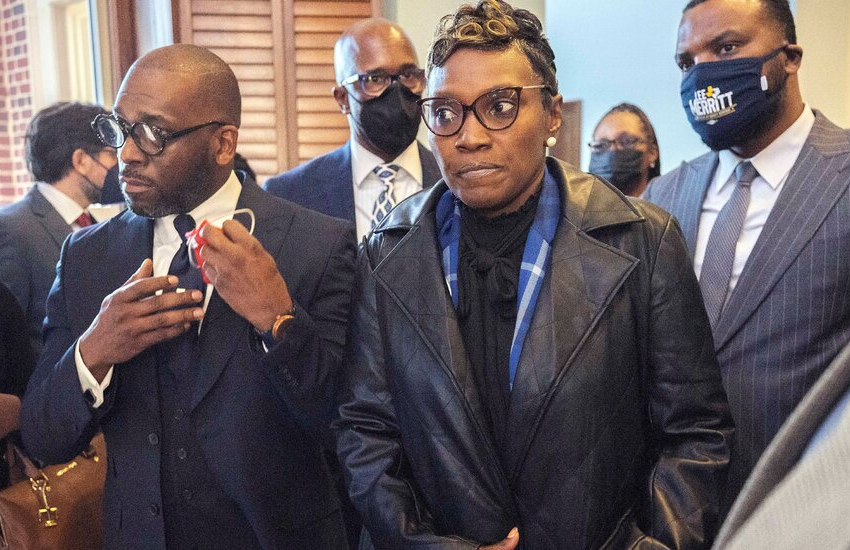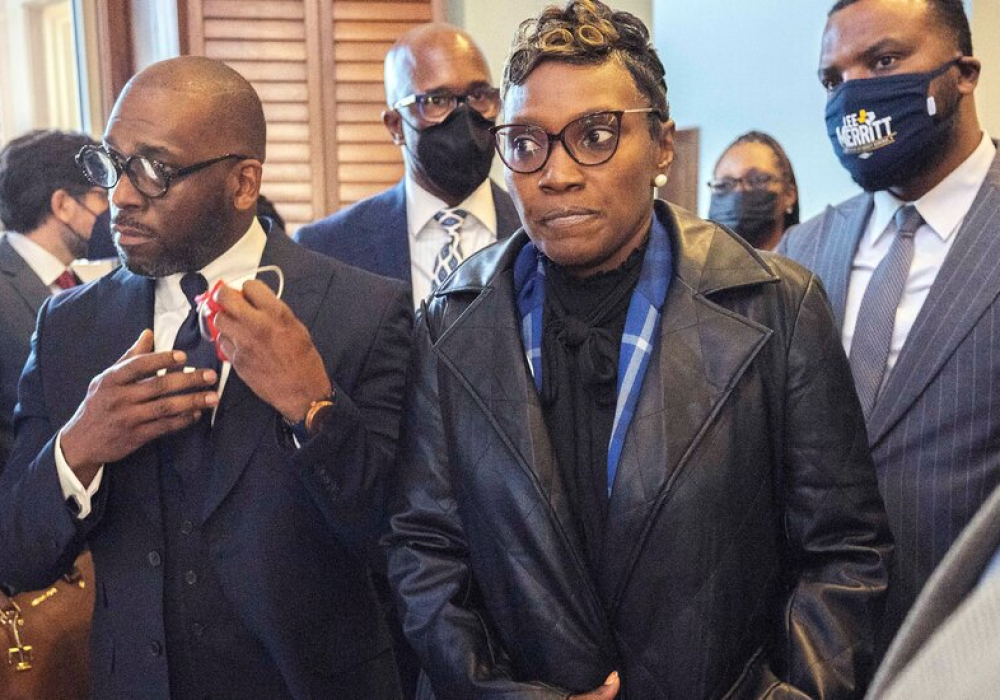ATLANTA — A federal judge on Monday rejected plea agreements with the Justice Department for two of the three white men facing hate crime charges in the killing of Ahmaud Arbery after his family expressed fierce opposition to the deal.
It was a surprising and extraordinary twist in a case in which a 25-year-old Black man was chased through a southern Georgia neighborhood by three white men and then shot to death. The plea deals would have been the first time that any of the men had admitted that Mr. Arbery’s killing was racially motivated.
All three men had been convicted of murder in state court in November. Mr. Arbery’s family angrily objected to the federal plea agreement because it would have sent at least two of them immediately to federal prison instead of state prison for up to 30 years. Federal prison is generally considered safer than state prison.
The decision by Judge Lisa Godbey Wood of U.S. District Court to reject identical plea deals hammered out between the U.S. Department of Justice and the two men, Travis McMichael, 36, and his father, Gregory McMichael, 66, means that the McMichaels could now see their federal case go before a jury as early as next week.
The third man involved in the chase, William Bryan, 52, was sentenced in state court to life with the possibility of parole. As of Monday evening, there was no indication that he had reached a plea deal with the Justice Department.
Prosecutors had hoped that the plea deals for the McMichaels would guarantee that the men would face serious prison time for the death of Mr. Arbery, even in the unlikely possibility that their state murder convictions were overturned on appeal. Their federal sentence would have run concurrently with their state sentences of life without the possibility of parole.
The deal would have also barred the men from appealing their federal guilty pleas.
For members of Mr. Arbery’s family, it was not enough. In a courtroom in Brunswick, Ga., close to the site of the killing, they spoke to Judge Wood of the ongoing trauma of losing Mr. Arbery, who was unarmed as he fled on foot from his pursuers. And they argued passionately that the men should not be allowed to choose a less-unpleasant prison option.
“I’m asking on the behalf of his family, on behalf of his memory, and on behalf of fairness that you do not grant this plea in order to allow these men to transfer out of Georgia state custody into the federal prisons, where they prefer to be,” said Wanda Cooper-Jones, referring to Mr. Arbery, her son.
Tara M. Lyons, an assistant U.S. attorney, argued that the plea agreement included a public admission from Travis McMichael that the killing was racially motivated. “Travis McMichael is admitting an important aspect which we believe will allow some healing to begin,” she said.
But Judge Wood noted that the deal was a special kind that would force her to agree to its exact terms. “And having considered all that was said today, and looking back at the law that governs these agreements, it is my decision to reject the plea agreement,” she said.
In a prepared statement, Kristen Clarke, an assistant attorney general, said on Monday evening that lawyers for the victim’s family had told the Justice Department that the family “was not opposed” to the plea deals.
“The Justice Department takes seriously its obligation to confer with the Arbery family and their lawyers both pursuant to the Crime Victim Rights Act and out of respect for the victim,” she said.
S. Lee Merritt, lead lawyer for Mr. Arbery’s estate, said Monday that the Justice Department did not communicate to the family or its lawyers that the deal would include a transfer to federal custody.
The Justice Department, he said, was “well aware” that the family “was opposed to such a condition.”
Paul Butler, a Georgetown law professor and former federal prosecutor, said that it was uncommon for a victim’s family to convince a federal judge to reject a plea deal once it had been agreed upon.
In general, Mr. Butler said, such deals are viewed positively by both federal judges and prosecutors. “The judge typically views an agreed-upon plea deal as efficient and fair, and to the extent that most plea bargaining includes an agreement from defendants not to appeal, it also protects the verdict, which is seen as helpful to both the prosecution and court — because there’s no chance of the verdict being overturned,” Mr. Butler said.
Judge Wood gave the two men until Friday to decide whether or not they now wish to enter guilty pleas.
Page Pate, a veteran Georgia trial lawyer, said that by entering guilty pleas, the men could hope that the judge would sentence them to something less than life, which is the maximum they could receive for the hate crimes charge.
But Mr. Pate noted that the family was facing some risk by lobbying for a trial. It may prove difficult to convince a jury that the men were motivated by hate, even if prosecutors are able to show that they had exhibited racist behavior in the past. In court on Monday, prosecutors noted that the truck that Travis McMichael used to chase Mr. Arbery was adorned with a Confederate symbol, and an F.B.I. agent said that Travis McMichael’s cellphone contained racist messages referring to Black people as “monkeys” and other slurs.
Understand the Killing of Ahmaud Arbery
The shooting. On Feb. 23, 2020, Ahmaud Arbery, a 25-year-old Black man, was shot and killed after being chased by three white men while jogging near his home on the outskirts of Brunswick, Ga. The slaying of Mr. Arbery was captured in a graphic video that was widely viewed by the public.
The victim. Mr. Arbery was a former high school football standout and an avid jogger. At the time of his death, he was living with his mother outside the small coastal city in Southern Georgia.
The suspects. Three white men — Gregory McMichael, 67, his 35-year-old son, Travis McMichael, and their neighbor William Bryan, 52 — stood accused of murdering Mr. Arbery. They told authorities they suspected Mr. Arbery of committing a series of break-ins.
The federal charges. The three men also face federal hate-crime charges. Prosecutors reached a plea deal with two of them, but a judge rejected the agreements with the Department of Justice after strenuous opposition from Mr. Arbery’s family.
Prosecutors also said that while Travis McMichael did not set out to harm a Black person the morning he fatally shot Mr. Arbery, he made dangerous assumptions about him being a criminal based on the fact that he was Black.
If the case goes to trial, the men also face an attempted kidnapping charge, and Travis McMichael faces a weapons charge.
These charges would have been dropped under the plea deal. And prosecutors noted that under the deal, the defendants would have been “admitting publicly, in front of the nation, that this offense was racially motivated.”
The case has been widely viewed as an act of racial violence. But in the state trial, prosecutors treaded lightly on the racial dimensions as they presented their arguments to a nearly all-white jury.
During the murder trial, the McMichaels said they had suspected Mr. Arbery of committing property crimes in their Satilla Shores neighborhood, outside of Brunswick. In video footage of the encounter, Mr. Arbery could be seen running as his pursuers chased him in two pickup trucks.
The chase ended when Mr. Arbery and the younger Mr. McMichael met in a violent clash. Mr. Bryan captured the violence on a video clip that was widely disseminated on the internet, leading to a national outcry and allegations that the killing had amounted to a modern-day lynching.
Lawyers for Travis McMichael — who fired his shotgun at Mr. Arbery three times at close range — have said that he had fired in self-defense.
A Georgia state investigator has said that Mr. Bryan told the authorities that he heard Travis McMichael use a racist slur shortly after shooting Mr. Arbery. Mr. McMichael’s lawyers in the state case disputed that claim.
On Sunday night, Ms. Cooper-Jones had said she opposed a plea deal in part because she wanted to put to rest the self-defense argument and to firmly establish that the men had been motivated by racism.
Katie Benner contributed reporting.













